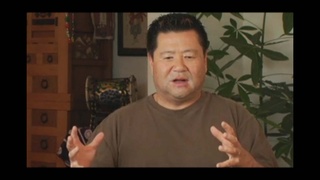Interviews
Collaborating with non-taiko groups
I’ve done things a lot with jazz artists. When Bobby McFerrin was here, he had me come up on stage, and we just did an impromptu thing. He started singing, and I was playing drums. Then I started doing vocalizations that we do and then handed him my sticks, and we started playing. And then, we were doing stuff back and forth. So, that was just totally impromptu.
Then stuff with Honolulu Symphony. Taiko and orchestra, a piece written by Takeo Kudo. Actually about the experience of Japanese Americans in World War II in the camps is what the theme was. But it had a more universal theme of people yearning to be free. And that featured me as a soloist. Sam Wong, who’s the musical director here, also has a concurrent position in Hong Kong. So he brought me out there to do that work with the Hong Kong Philharmonic. And just next month, we’re going to do a new piece with the Honolulu Symphony called “Concerto for Taiko and Timpani,” which will feature myself and Stuart Chafetz as the head timpani player from Honolulu Symphony. So, that’s just a few of the things. I do stuff with theatre groups, with dance groups, with other things.
Date: March 11, 2005
Location: Hawai`i, US
Interviewer: Sojin Kim, Arnoldo Hiura
Contributed by: Watase Media Arts Center, Japanese American National Museum.






